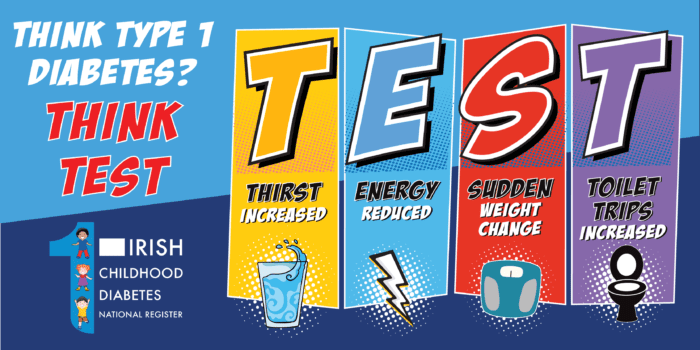- Delayed diagnosis of Type 1 diabetes can lead to the life-threatening condition known as DKA which is very serious and needs urgent hospital treatment. DKA is an avoidable complication of diabetes which could be easily avoided by early recognition of symptoms and timely diagnosis.
A new collaborative campaign between Diabetes Ireland and the Irish Childhood Diabetes National Register, supported by Norah Casey, Professor Edna Roche, Consultant Paediatrician and Endocrinologist alongside diabetes advocates Eva Lee and her son Danny and Jay Hickey aims to raise awareness among the general public about the symptoms of Type 1 diabetes, equipping individuals to recognize these signs early, seek help and avoid the development of Diabetic Ketoacidosis (DKA).
Children in Ireland have the 10th highest reported incidence of Type 1 diabetes in the world. The rate of new-onset type 1 diabetes in Irish children and young people is 37.6 cases/100,000/year which is very high. In the period 2019 to 2021, the rate has increased by 21% (or 10% per annum). On average 7 children and teenagers are diagnosed each week with Type 1 diabetes in Ireland.
To raise awareness of the symptoms of Type 1 diabetes we have developed an acronym, TEST, which stands for Thirst (increased), Energy (reduced), Sudden (weight change), and Toilet (trips increased). These symptoms serve as critical indicators that you or someone you know might have Type 1 diabetes, warranting an urgent blood glucose or urine test. It’s important to note that these symptoms apply to adults as well as children.
The campaign was initiated due to the critical importance of early diagnosis of Type 1 diabetes, and very high rates of DKA at the onset in children. Type 1 diabetes develops when the pancreas stops producing insulin, a hormone which is essential to live. When insulin levels are insufficient, the glucose levels start to rise, and symptoms can appear. The sooner these are recognised, the less likely DKA will develop. Delayed diagnosis puts people’s lives at risk and can influence diabetes outcomes in the future.
Type 1 diabetes can affect individuals of all ages. It is estimated that around 0.6% of the Irish population (30,895 people) are diagnosed with Type 1 diabetes with numerous adults receiving Type 1 diabetes diagnosis each month.
Worryingly a very high proportion of children present with DKA at the time of diagnosis of their diabetes with 43% or more than 4 in 10 children having DKA at the time of Diabetes diagnosis.
Commenting on the launch, Professor Roche stated:
“Type 1 Diabetes can be very dangerous if the diagnosis is delayed, however, if you know the signs and symptoms to look out for it is easy to diagnose and incredibly manageable. Our goal is to reach at least 1 million people in Ireland with our message and we cannot achieve this on our own. It is so important to know the signs and to spread awareness of TEST to your family and friends. It really could be a lifesaver.’’
The symptoms of Type 1 diabetes at the start are subtle, and they are often missed or misconstrued as a simple viral or urine infection resulting in delays in diagnosis with potentially severe consequences for the individual and those closest to them.
Norah Casey, an Irish businesswoman, Norah received a diagnosis of Type 1 Diabetes in 2022, following a diagnosis of long-covid Commenting at the launch said:
“Adapting to my diagnosis of Type 1 Diabetes has of course been difficult. I am still getting used to my blood sugars being all over the place. I am coming to terms with my diagnosis, but it is certainly a learning process. Meeting and hearing the experiences of others has been so beneficial throughout my journey with Diabetes. It is so important to be able to recognise the signs and symptoms of Type 1 Diabetes and TEST is such a simple and effective way of doing so. I am delighted to be a part of spreading this message to others who may need it.’’
Unfortunately, Type 1 diabetes is sometimes not considered as a primary diagnosis when symptoms first appear in adults. Diabetes Ireland wants to enhance awareness of the TEST acronym among the general public and healthcare professionals alike. A simple finger-pick blood glucose test or urine check by a GP or pharmacist can greatly help make the diagnosis of Type 1 diabetes.
Type 1 diabetes occurs when the pancreas stops producing insulin, and as a result of this, a person needs to take replacement insulin by pump or by injection. Management of type 1 diabetes is individualised. There have been huge advances in the monitoring and insulin treatment for those with Type 1 diabetes in recent years with support and help for those with diabetes.
Kieran O’Leary, CEO, of Diabetes Ireland, highlights the ongoing challenge of delayed Type 1 diabetes diagnosis in Ireland:
“Delays in the diagnosis of adults with Type 1 diabetes is also an ongoing problem in Ireland. In our recent survey on “Experiencing, Accessing and Using Diabetes Health Services by people with diabetes” 41% of adults living with Type 1 diabetes reported having DKA at the time of diagnosis. Through this awareness campaign, we are asking everyone to remember the TEST acronym and what it means and if you recognise these symptoms or as a healthcare professional feel Type 1 diabetes maybe present, do a simple blood glucose finger prick test which can greatly help make the diagnosis of type 1 diabetes immediately, preventing the onset of DKA and possible hospitalisation.”
Professor Edna Roche discusses the importance of early detection of type 1 diabetes in young children and teenagers.
To learn more about the Test campaign click here.
The campaign is a collaboration of the Irish Childhood Diabetes National Register and Diabetes Ireland and is supported by Novo Nordisk Ltd.
To find out more about living with diabetes, becoming a member or upcoming events or to follow Diabetes Ireland on social media visit https://www.diabetes.ie/.


